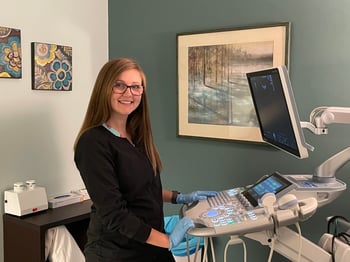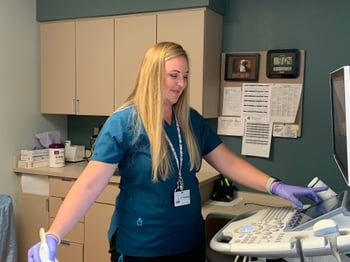
Ultrasound is frequently utilized throughout pregnancy for a number of reasons including checking fetal viability, number, growth, and assessing fetal well-being. Our ultrasounds are performed by accredited sonographers and interpreted by your obstetrician.
Every pregnancy will have a fetal anatomy scan performed between 19-21 weeks to screen for birth defects, assess fetal growth, and evaluate the placenta. This is a transabdominal ultrasound that typically lasts between 45-60 minutes to obtain all of the images and measurements required by our physicians. We try to schedule these ultrasounds prior to your appointment with your OB physician for patient convenience and faster results.
Video Transcription:
Hi. My name is Nikki and I’m one of the sonographers here at Moreland OB-GYN. I’m here today to answer some questions regarding the routine anatomy ultrasound that is typically performed midway through a pregnancy. Ultrasound is a safe technology that uses sound waves to create an image of internal body structures like your baby. Moreland OB-GYN prides itself on providing the highest level of patient care, and the ultrasound department is no exception. We are AIUM accredited which means we meet or exceed nationally recognized standards in the performance and interpretation of diagnostic ultrasound examinations. The detailed anatomy ultrasound typically occurs between 18 and 20 weeks gestation. The sonographer will take a comprehensive look at your baby. This includes baby’s heart, brain, spine, and even baby’s little toes. It’s a sonographer’s job to take images and measurements of the baby for the doctor to see how your pregnancy is progressing and how big your little one is. This is also the point in pregnancy where we can see baby’s gender if you would like to know. This ultrasound can be a great way for you and your partner to bond with baby, so we encourage patients to keep distractions and visitors to a minimum during a scan. Your sonographer has a long list of images that are required, and we do our best to see everything on that list. Sometimes, a follow-up scan is required to visualize everything on our list. Your physician will ultimately let you know if you may need to return for any follow-up imaging. We do not require that patients have a full bladder for their anatomy scan, but it can be helpful to avoid using the restroom right before the scan starts. In the event that your baby is taking a nap during the scan, and we can’t get all the images, it can be helpful to have mom get up, walk around, and use the restroom to try to get baby to change positions. There are a lot of different factors that go into how long your ultrasound will take. If baby’s showing off and cooperative, then it can be as quick as 40 minutes. If baby is being a little bit more stubborn, then it might take almost 90 minutes to get all of the required images. Our sonographers are persistent and there are multiple different tips and tricks we can try to get your baby to move. We often get asked, “Will I get images of my baby?” Yes, of course, you will get images of your baby. We use a service called Tricefy that allows us to send your ultrasound images right to your phone or email. You can follow the link to view, download, and share your images with family and friends. I hope this video was helpful—it is Moreland’s goal to lead you to better health.
Ultrasound testing is a way of finding out what is going on inside a body without invasive measures. It uses the reflections of high-frequency sound waves to construct images of internal organs. These reflections are then recorded, which creates a picture of what is going on inside the area of the body being studied.

Ultrasound testing in pregnancy is helpful in determining the age and position of the unborn baby, location of the placenta, the number of babies present, and to observe fetal growth and movements.
Most of our patients will have their ultrasound(s) performed in our clinic unless your physician finds it necessary to have you go to the Perinatal Assessment Center for a targeted ultrasound due to a high–risk pregnancy. If any further testing is necessary in addition to the 18-20 week scan, it will be determined on an individual basis by your physician.
There is usually no specific preparation needed for this test. There is no need to drink a certain amount of water before the test, however, it is recommended that you do not urinate immediately prior to your ultrasound.
 Who Performs the Test?
Who Performs the Test?All ultrasounds are performed by AIUM accredited sonographers.
The 18-20 week routine anatomy ultrasound commonly lasts about an hour.
There are no known side effects or risks associated with ultrasound testing.
Phone: 262-544-4411
Fax: 262-650-3856
Monday-Thursday:
7:30 am – 6:00 pm
Friday:
7:30 am – 4:00 pm



